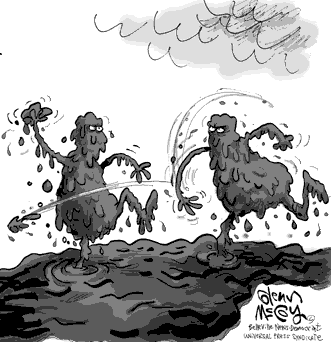 I have been following the reports of demonstrations, riots, emotional distress, etc. that has come an aftermath of the recent election of Donald Trump and Mike Pence. I've also read and heard a good bit of reaction to these events. For any who don't know me, I need to let you know that I'm in the heart of the demographic that is being talked about in many of these stories. I'm White, conservative, Christian, straight, and from the Bible belt. I'll try to not be scary.
I have been following the reports of demonstrations, riots, emotional distress, etc. that has come an aftermath of the recent election of Donald Trump and Mike Pence. I've also read and heard a good bit of reaction to these events. For any who don't know me, I need to let you know that I'm in the heart of the demographic that is being talked about in many of these stories. I'm White, conservative, Christian, straight, and from the Bible belt. I'll try to not be scary.Sitting in my warm and comfortable living room this morning it occurs to me that a mantra that I have been reciting concerning a ministry I'm involved in probably has some relevance in the current situation in my world:
PERCEPTION IS REALITY.
Now I'm not getting all New Age-y here. For one thing the "New Age" is old enough to be on Medicare (and since it is sick it needs to be). I have railed against concepts like, "If you can dream it you can do it." I know there is a certain motivational factor to this kind of statement, but I have been around long enough to also see the truth behind this cynical view from Despair.com.
What I mean when I say "Perception is Reality," is if I am going to build any kind of positive relationship with people who have a different view of what is going on around us than I do, I need to grant their view a measure of legitimacy. Say I'm having a pretty good day. My caffeine intake is about right. I haven't gotten any audit notices from the IRS, and the sun is shining. In my bliss, perhaps ignorant bliss, I greet my friend, "Hi. How are you?" My friend clearly doesn't get that my question was a courtesy, a greeting more than a request for information, and proceeds to spew forth a stream of that witch is dark and painful. At this point let's assume that I really do care about my friend. I really would like to have a relationship with him going forward. How will that best be achieved?
- By immediately pointing out why I think his view of reality is utterly wrong?
- By questioning his maturity, intelligence, and/or spirituality?
- By uttering some feel-good platitude? (The cartoon is offered tongue in cheek, but it make a point.) Or,
- Taking a moment to listen to my friend.
The way others perceive reality, is the reality that has to be dealt with in getting along with those
Don't get me wrong. I'm not saying that we should surrender our intellect and act as if things that matter don't. What I am saying is that out of the things that matter it is difficult to find anything that matters any more than another human being. Listen to James, again.
. . . the tongue [I think we can extend this other forms of communication].
It is restless and evil, full of deadly poison.
Sometimes it praises our Lord and Father,
and sometimes it curses those who have been made in the image of God. . .
blessing and cursing come pouring out of the same mouth.
Surely, my brothers and sisters, this is not right!(James 3:8–10, NLT)
It is restless and evil, full of deadly poison.
Sometimes it praises our Lord and Father,
and sometimes it curses those who have been made in the image of God. . .
blessing and cursing come pouring out of the same mouth.
Surely, my brothers and sisters, this is not right!(James 3:8–10, NLT)
It doesn't help. It just muddies things up. I'm trying to hear. I've read articles that forced me to my dictionary, and compelled me to go back and read paragraphs again. I've read stuff that took pages to say, "I don't like this!"--the election, the demonstrations, etc.. I often don't agree with either--at least not completely. I am, however, working to hear those on all sides. I'm not saying that each of us
Like Frasier, I'm listening. Or, at least I'm trying.




